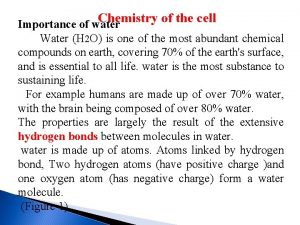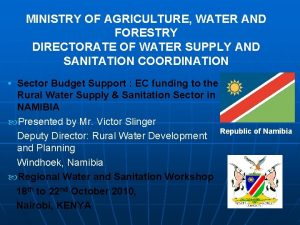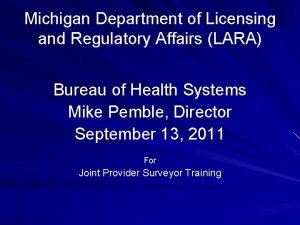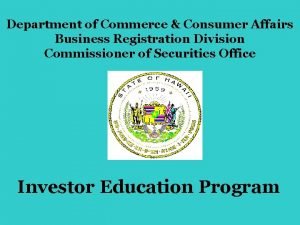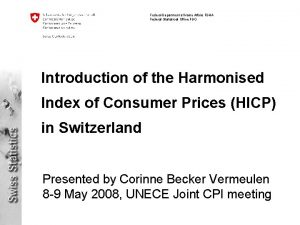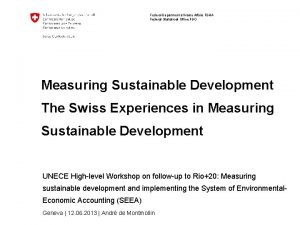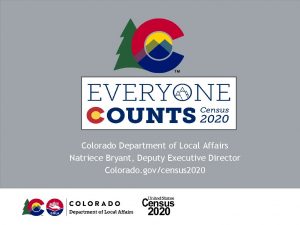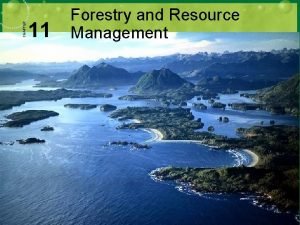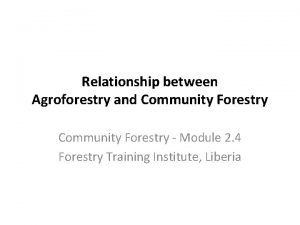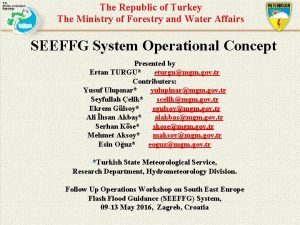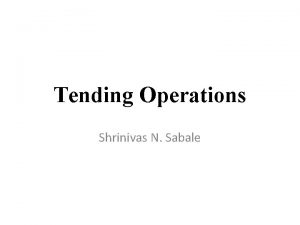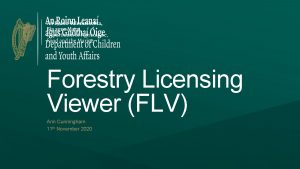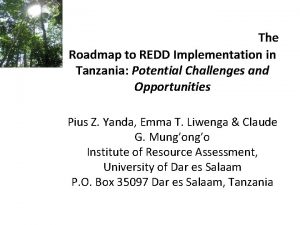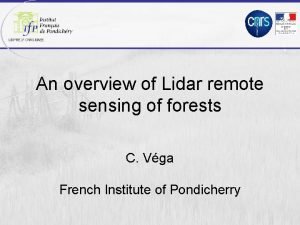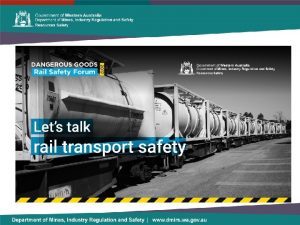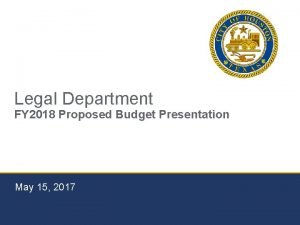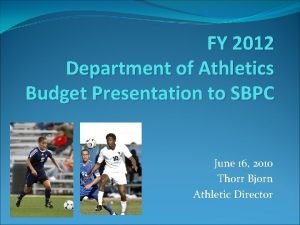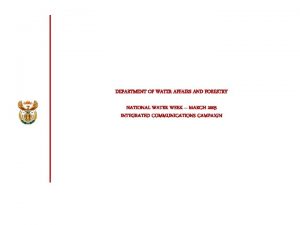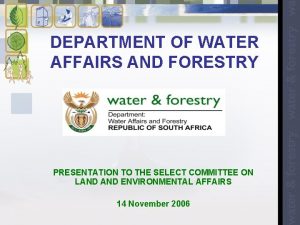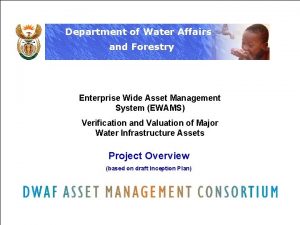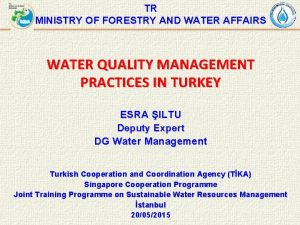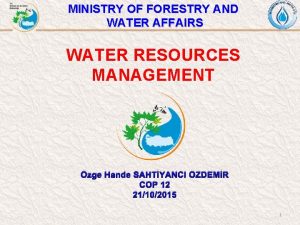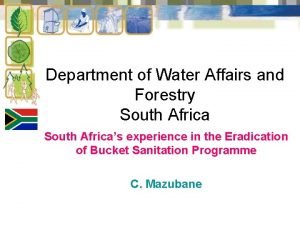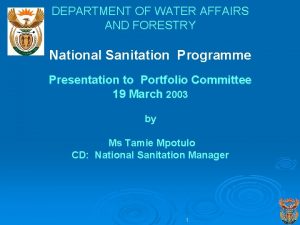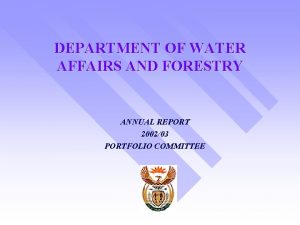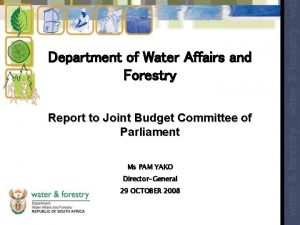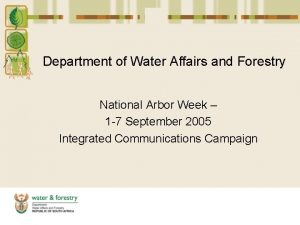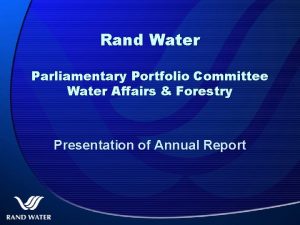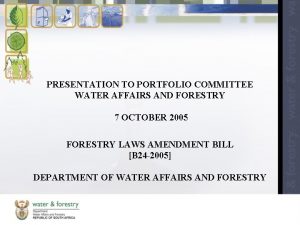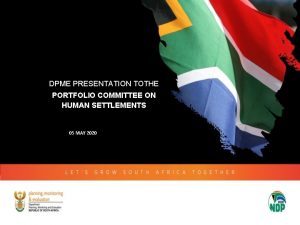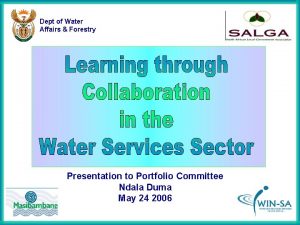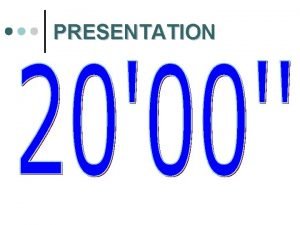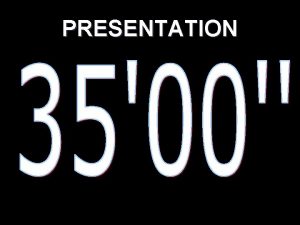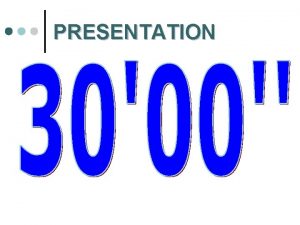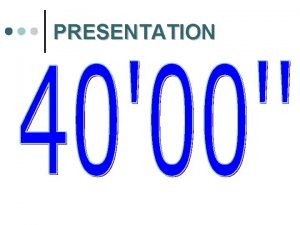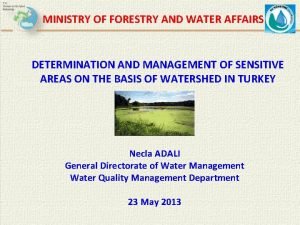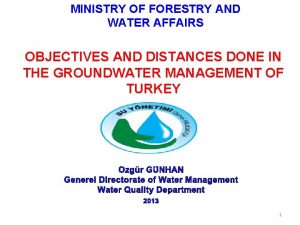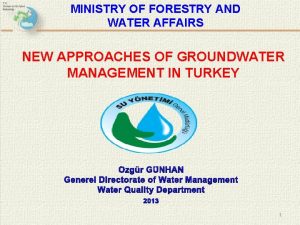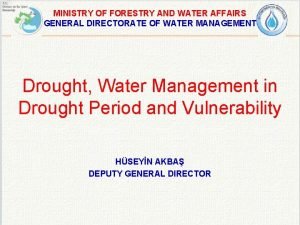DEPARTMENT OF WATER AFFAIRS AND FORESTRY PRESENTATION TOTHE
































- Slides: 32

DEPARTMENT OF WATER AFFAIRS AND FORESTRY PRESENTATION TOTHE PORTFOLIO COMMITTEE ON RECOMMENDATIONS MADE ON OVERSIGHT VISITS AND PUBLIC HEARINGS IN LIMPOPO AND NORTH WEST PROVINCES Presented by: DDG: Regions Ms Thandeka Mbassa

Summary of issues raised • • • • The need for practical, effective and hands on support to municipalities on: Delivery of water and sanitation Intervention plans in case of disasters and periods of drought Good governance= efficient and cost effective provisioning of services Compliance to legislation Water quality Operation and maintenance- proper budgeting Free basic services Section 78 and institutional reform Planning- alignment of WSDP’S and IDP’s Delays in implementation of De hoop Dam Transfer of schemes Integrated planning vertical and horizontal alignment The role of the province The role of the water boards

North West 3

Rooigrond informal settlement Issue raised Progress to date 1. No access to water and sanitation - Currently municipality provided two 5000 L tanks & 25000 L which are filled by tankering water from Mafikeng water purification plant (MWPP) - DWAF RO recommended to the WSA to apply for connection from MWPP’s supply line to Rooigrond prison because of the close pronximity Further intervention - Municipality plans to move community 200 m to the east where RDP houses will be built by end of financial year 2006/07

Taung Flood areas Issue raised Progress to date Contamination and lack of water supplies in the flooded areas in Taung Tanks provided to affected communities by Bophirima DM(BDM) & Sedibeng Water board (SWB) & also pumped out contaminated boreholes. - H/H awareness on chlorination and boiling of water conducted. - BDM spent 8 mil on water and sanitation projects and replaced 1. 7 km of pipeline washed away and water has been restored to all - Water quality testing done by BDM Further intervention -Assist municipalities with bulk infrastructure funding for eradication of backlogs - Assist BDM with water quality testing and consistent monitoring through the DWAF support programme for DWQ monitoring

WATER /SANITATION IN LEKWA-TEEMANE Issues raised Progress to date The potable water supply was contaminated by overflowing manholes upstream of the abstraction point for potable - Action plan drafted & implemented with involvement of NC & , NW & HO DWAF (including the two Cuban experts) & Sedibeng Water. - protect the abstraction point by building -contaminated water supply caused a wall around the infrastructure and to cholera outbreak which affected 1273 protect the high lift pumps with screens people in 2006. upstream of the pumps in the short term -problem was caused by power - whole reticulation system including the shortages as well a damage to pumps Water Purification Plant cleaned and due to foreign matter in the sewer lines disinfected including all reservoirs and a & lack of proper qualified operators to monitoring regime was agreed. operate the 2 plants Further intervention Municipality advised to divert the overflow from the manholes in case of power outages into a containment dam and to pump the sewage back into the sewer line once the powers is restored.

Rustenburg municipality Issue Raised Progress to date -Household Water and sanitation, clinic and school sanitation and especially backlogs in buckets eradication needs to be adressed with urgency in the whole NW province - Feasibility for higher levels of service to be done to ensure long term sustainability of service - Improve accuracy on backlog information for improved planning & allocation of resources -DWAF NW developed an action plan with specific intervention to support fast tracking of delivery - Funding from Treassury already allocated to address backlogs in clinic and schools - A verification of backlogs is done in conjunction with DPLGH to achieve accuracy of information Further interventions -Specific WS b. P’s developed to address gaps on cost recovery, billing & other issues - Arrange meeting with MEC to raise critical WS issues and call for support

CMA’s and WUA’s establishment Issue Raised Progress to date -Representivity and participation by emerging farmers in the establishment of the WUA’s -participation of resource poor farmers, especially women in the transformation DWAF has arranged for a stake holders’s participation meeting on the 09 March 2007 to address all issues raised regarding participation of Irrigation Boards - Lack of participation of councilors has resulted in some cases in the lack of participation by communities. Further intervention Develop a database of all Ensure all stakeholders including councillors and ensure they are all invited to meetings & processes pertaining to establishment of CMA’’s and WUA’s

Haartebeespoort Dam Pollution Issue raised -Most water purification and sewage treatment plants in the area have reached their capacity. -Madibeng Municipality is struggling to raise funds to maintain these water and Progress to Date - Dam Remedial programme underway a BP developed to be implemented by Rand Water under the guidance of the a steering committee to be esstablished. sanitation works. -Dam is costly to purify due to the extreme level of pollution in the water. - Lack of co-ordination in nthr disposal of land around the Dam between Madibeng municipality and NW DACE environmental unit Further intervention Provide resources to establish and maintain the two Management Committees viz. Hartbeespoort

LIMPOPO PROVINCE EXECUTIVE SUMMARY OF PROGRESS 10

1. WATER QUALITY • Monitoring 11 team consisting of qualified staff both in Regional Office and on district are monitoring the quality of water supplied to communities on regular basis • Additional 6 posts technician are to be appointed during the next financial year 2007/08 • Recommendations are made and support given at all times intervention(s) is required.

O&M budget and Repairs of Resources • According to the BP for WS all the normal defects are to be repaired within 72 hrs. • Challenges – Vandalism is rife in the province. To this effect the province is piloting on two strategies Capricorn Municipality. • One strategy is the use of trailers where the operating units are mounted to trailers and ferried to site on daily basis • Second strategy is the installation of tracker system in the pumping units – O&M is carried under extreme financial constrains. Budget allocation is far less than the budget required e. g. 2006/07 budget required 684 m 2006/07 budget allocated 529 m

Transfer of assets to WSA • To date all WSA’s have signed the transfer agreements. • Agreed possible transfer dates with all WSA are as follows: – – – – Vhembe Mopani Mogalakwena effected on Polokwane Capricorn Sekhukhune Lephalale effected on 01/04/2007 still to be determined 01/01/2007 01/04/2007 01/03/2007 01/04/2005

Transfer of Water scheme from Dept. Public Works to Mopani D Municipality • DWAF together which MDM are continuously engaging the Dept. of Public works on the transfer of their water scheme to the WSA (MDM). • According to the action plan transfer of ownership of the water scheme is scheduled for 01/07/2007

Free Basic Water • An endeavor is continuously being made for the provision of FBW to poor communities as illustrated by the following – Poor population 3, 169, 418 – Poor population served 2, 125, 143 • Total poor population served increased from 66. 34% as at the end of December 2006 to 67. 1% by end of January 2007.

Service Delivery Acceleration Plan Part 2 16

Proposed National Service Delivery Acceleration Plan The Department of Water Affairs and Forestry to take its leadership role in driving further development and implementation of the National Service Delivery Acceleration Plan in partnership with DPLG Provinces, Municipalities, and other role-players. The National Service Delivery Acceleration Plan has two components: And a an action plan to accelerate delivery of water. There are six key strategic pillars of the National Service Delivery Acceleration Plan: • • • DWAF working with all other role-players to play a stronger, more visible and hands on leadership role in water and sanitation delivery at municipality level. Review of current delivery mechanisms to achieve better economies of scale Enhanced, proactive the targets Enhancing sustainability and more active political engagement. Explore more funding channels and approaches Targeted approach to meeting

2. DWAF to take a Leadership Role in deliver • The Minister of Water Affairs as the accountable Minister to be given the “mandate” to implement the service delivery acceleration plan. This involves a hands on approach on water and sanitation delivery, monitoring, evaluation of progress, intervention where such a need has been identified. • Where there is a need an agreement between all the parties, DWAF should come in and provide implementation support • DWAF as leader take proactive action through its support programme to ensure services supply to school to clinics. An agreement between National Treasury, Do. E and Do. H has been reached to allocate funding to DWAF to implement the programme. • DWAF to be provided with the resources required to perform the above functions 18

2. Review delivery mechanisms and achieve better economies of scale • • Acceleration of service delivery will require a review of the current delivery mechanisms and mobilise all resources to fastrack delivery e. g. • Water Boards • Civil society • Private sector, South African Institute of Civil Engineers, South African Black Technical Association etc, DBSA “Siyenza Manje” • Other municipalities To start “A new dialogue on partnerships” between civil society, private sector, between municipalities etc 19

3. Enhanced and proactive political engagement • Formal campaign to be developed to enlist more active involvement of political leaders, particularly at provincial government level and local level. The MEC’s of Local Government to be the “champions” of water and sanitation in the Provinces • Intensification of training programmes for councillors to enable more effective involvement in service delivery. • A communication strategy to be developed to raise community awareness on service delivery plans in their areas • Minister of DWAF to play key lead role in engagement with Premiers, MEC’s and Mayors in mobilising support and cooperation between departments and role-players • Ongoing monitoring and coordination mechanisms will be needed at both provincial and national levels 20

4. Review funding channels and approaches • A task team will be established to look at the funding models and levels. • More funding flexibility required e. g. to provide more funding to municipalities with capacity and high backlogs • Trilateral discussions on all of the above with Treasury and DPLG 21

5. Provide interim services • This approach is aimed at addressing access to water in communities where there is a dire need , e. g. many parts of Limpopo, Eastern Cape, Kwa. Zulu Natal communities still share water with animals. • This approach encourages municipalities to be creative in their approach to service delivery and provide interim water supply whilst more sustainable and longer term solutions are being worked on. The following options can be looked into: • Use of boreholes and hand-pumps • Protection of natural streams • Repair of dilapidated infrastructure like windmills to ensure that communities have some form of access to safe drinking water. • The need to look at alternative technologies, especially in sparsely populated rural areas 22

6. Enhancing sustainability • Improve sustainability considerations in the budget allocation process, i. e. funding for operation and maintenance of infrastructure to be prioritised. The conditions of equitable share may have to be revisited. • Secure an additional funding source for sustainability interventions via discussions with Treasury and DPLG • Implement a comprehensive Water Services Provider support mechanism (see proposals in the Sector Support Strategy work) 23

Plan to meet accelerate water and sanitation delivery to schools. • National treasury has made an allocation of R 950 m (30% of the funding which is for electricity backlogs) over a three year period to address backlogs in schools and clinics. • All parties have agreed that funding for water and sanitation will come to DWAF who will be an implementing agent to support Provinces. • With the allocated funding, and with DWAF providing support, the water and sanitation backlogs in CLINICS will be eradicated by the end of the 2007/08 financial year. • In Provinces where there are serious capacity constraints, DWAF will provide the necessary implementation support, however, focus of the programme will be on strengthening existing delivery mechanisms and building capacity. • An Action plan for implementation will be developed in consultation with all role-players.

Interventions to accelerate Household Sanitation “Operation Gijima” • DWAF developed sanitation acceleration strategy “Operation Gijima” • Approaches proposed in Strategy include six key strategic pillars o Identifying critical areas with highest backlogs o DWAF to be more hands-on in the management of the Rural sanitation programme. o DWAF to provide direct hands support and leadership within municipalities with critical capacity constraints o Enhance municipal delivery through the MIG o Partnership with municipalities o management teams to ensure effective planning and implement projects, information integration and management)

FOCUS OF OPERATION GIJIMA q Municipalities Struggling to effectively plan and implement sanitation q Municipalities Within Project Consolidate; q Municipalities which have spent less than 50% of their MIG allocation; and q Schools and clinics in rural areas without basic sanitation facilities. - Funds will be allocated to DWAF for this purpose in the 2007/8

Proposed Methodologies for Direct Implementation Support Ø Turnkey Management: The turnkey approach involves partnership between private, public, small contractors and organs of civil society. This approach allows for maximum benefits through large scale and regional implementation Ø Term Tender: The term tender approach creates opportunities for large -scale procurement of materials. Ø Community based management: The wide-scale training and supervision of community level management teams (best suited in sparsely populated communities). Ø Mixed approach: A combination of the approaches could be used at a regional level.

7. Enabling Factors • Continue to support relevant skills development interventions (e. g. Siyeza manje) in line with JIPSA • Continue to strengthen relevant institutional support and development initiatives (Project Consolidate) through support to local government initiatives • Putting in place stronger monitoring and evaluation mechanisms at both provincial and national levels • Improving governance structures for monitoring progress at provincial and national level • Strengthening intergovernmental relations • Improving communication at all levels, especially at community level 28

Towards implementation of Service Delivery Acceleration Plan • Finalization of the Action plan with key role player- SALGA, DPLG, NT etc. • Communication Campaigns Focusing on 2007 targets Mobilization at all levels The role of DWAF • Strengthening the Regional office- Filling in of critical posts • Strengthening support to Regions and Provinces • DWAF regional offices to mobilize support from Provincial mobilization • Development of Provincial Plans

BULK INFRASTRUCTURE PROGRAMME SECTION 4 30

Key Drivers of Regional Bulk Infrastructure • • Water availability and scarcity Benefit of scale Integrated management & institutional arrangements Special financing needs MTEF allocations: • 2007/2008: • 2008/2009: • 2009/2010: R 300 million R 450 million R 650 million

DWAF’s ROLES AND RESPONSIBILITIES • • Financial accountability for programme Programme coordination and management Programme and partnership alliance Macro planning, strategic perspectives and priority determination Coordination of project specific feasibility studies and implementation planning Project implementation management Monitoring and Evaluation (M & E) Sector Support
 Water and water and water water
Water and water and water water Maine dept of agriculture
Maine dept of agriculture Ministry of agriculture, water and forestry directorates
Ministry of agriculture, water and forestry directorates Michigan department of licensing and regulation
Michigan department of licensing and regulation Department of commerce and consumer affairs
Department of commerce and consumer affairs Va form 10-250
Va form 10-250 Federal department of home affairs fdha
Federal department of home affairs fdha Federal department of home affairs fdha
Federal department of home affairs fdha Federal department of home affairs fdha
Federal department of home affairs fdha Department of local affairs
Department of local affairs Forestry and resource management chapter 11 answers
Forestry and resource management chapter 11 answers Forestry and resource management chapter 11 answers
Forestry and resource management chapter 11 answers Mendel university fees
Mendel university fees State and private forestry
State and private forestry Difference between agroforestry and community forestry
Difference between agroforestry and community forestry Eturgu
Eturgu Tending operations in forestry in hindi
Tending operations in forestry in hindi Forestry licence viewer
Forestry licence viewer La county forestry
La county forestry Forestry io roadmap
Forestry io roadmap Careers related to forestry
Careers related to forestry Importance of forestry
Importance of forestry Full waveform lidar
Full waveform lidar Miisun forestry
Miisun forestry Indian farm forestry development cooperative limited
Indian farm forestry development cooperative limited Forestry tep
Forestry tep State forestry administration
State forestry administration Close-to-nature forestry
Close-to-nature forestry Wa department of water and environmental regulation
Wa department of water and environmental regulation Fetal lie
Fetal lie Cephalic presentation
Cephalic presentation Legal department presentation
Legal department presentation Athletic department budget presentation
Athletic department budget presentation
